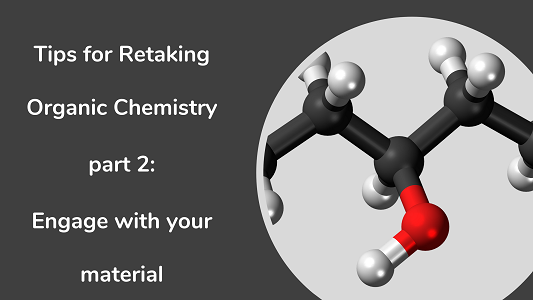How to Recognize a Bad Professor
Science-related majors take a large portion of university majors. Most science majors do require at least two semesters of chemistry, typically general chemistry, but can require as many as six or eight for majors in biology or health-related areas. And of course, you’ll have a whole variety of chemistry every semester if you’re a chemistry major. You already know that chemistry is hard. But chemistry with a bad professor is impossibly hard!
Your success in chemistry along with how much fun—or misery— the course is going to be greatly depends on your professor. Since many students take chemistry courses, those are usually offered in a number of sections taught by different professors. Larger universities can have up to a half-a-dozen sections and as many professors teaching those. This is, obviously, a problem when it comes to choosing the section as not all professors are the same.
I have been working with chemistry students since 2004 and have collected a rather interesting and eclectic database of chemistry instructors and their quirks. Based on my experience with students from 600+ instructors all over the country, I have noticed certain “features” that bad professors show. Here, I want to share those with you, so you can identify a bad professor and act accordingly.
Credentials Braggers
“Hello. My name is Dr. Cool, I’m a professor of chemistry, I have a doctorate in organic chemistry from An Awesome University and I did my post doc at Even Better University.” After an impressive introduction like that you would want to run away from this class as far as possible. In my experience, a good professor with impressive credentials doesn’t need to brag about those. Only professors who due to whatever personality flaws need to put themselves onto such a pedestal before their students do so. These professors are usually quite condescending and are here to show off. Alternatively, these professors are indeed awesome in their field but are forced to teach the course because they are, well, university professors. Then they will teach as if they are doing you a favor. In either case, credentials bragging is a symptom of a bad professor.
“I’ve been teaching this course for longer-than-you’re-alive years”
One of my ex-colleagues once told me in a private conversation that he was 63, he’s been teaching for 26 years and he knows better how to teach! For the record, said professor has a 2.0 rating on ratemyprofessors.com. Often, professors like that are trying to establish their authority in their classroom by saying how long they’ve been teaching and that questioning their judgement is not a good idea. Also, these professors usually teach from notes they’ve made 10-15-20 years ago. I worked with one such instructor who wrote her notes during her second year teaching about 14 years ago. The amount of notes and corrections that she has had added to her notes over the years were so confusing that often she could not understand her own notes and by extension confused the entire classroom.
Another serious problem with such professors is that they are often out of date with the material they teach and rarely incorporate modern chemistry into their lectures. Although, this is not detrimental for the final exam, it gives students skewed and outdated view of chemistry as a constantly evolving and developing science.
“30% of students taking this course fail”
Although it is true for most chemistry courses, this piece of information can be delivered in two very distinctive ways. Firstly, your professor might be just implying that chemistry is a very serious course and you should expect to work hard to succeed. Alternatively, you should translate it as “I’m a jerk and you gonna have hard time in my class no matter what.” Last semester I was working with a student whose professor decided that their last exam had a rather high average score and made their next exam deliberately hard adding material not covered in class or book to it. If your instructor is of a latter type—run!
Criticizing Their Colleagues
First of all, this is poor manners. Of course, some of us might disagree with our colleagues. This is still not a reason to publicly criticize them to your students. Secondly, you can be sure that this professor is sharing his opinions of his students with other students too. I was “fortunate” enough to have my office two doors down the hall from one of those criticism-inclined professors. Naturally, among instructors, we do “gossip” about our students. But that’s among instructors—people do talk about their job, and students is ours. My office neighbor would spill his opinions about his students to anyone polite enough to listen including students coming to his office hours. Would you like to take a course from an instructor who would talk about you behind your back to your classmates?
“People Pleaser”
This is, perhaps, one of the trickier ones. These professors are loved by their students, they are very nice, accommodating, friendly, enthusiastic, funny, and give good grades. Don’t get fooled—this is a charade to get an outstanding teaching evaluation. This is usually observed with instructors who are up to their tenure or other promotion. Don’t get me wrong, you’ll probably get a high grade and it won’t be difficult. You won’t learn much either. If you know that you’ll need to apply chemistry in the future, say, to pass you MCAT or GRE exams, you might want to look elsewhere.
Professors who emphasize what they like
These professors are rarely obvious at the beginning of the term, so I put it as the last “symptom.” Professors who teach chemistry often specialize in a specific sub-field of chemistry and, when applicable, but more often just because they can, they teach and emphasize topics that they like in their course. Good examples would be professors emphasizing physical chemistry in organic chemistry course (lots of orbitals, quantum chemistry, thermodynamics, etc.), or nanoscience in general chemistry, or specific analytical method in analytical chemistry, etc. You will not only end up learning a lot of not directly relevant information but this information is unlikely to be in the textbook either.
Worst of all, is when the instructor has written his own textbook that he or she wants to use in their classroom. You may argue that their book is specifically tailored to their classroom. Well yes, when it is a high-level advanced class, that’s reasonable, not when it’s a sophomore organic chemistry, for instance. There’s a reason why their book has not been published, and this reason is not because it is awfully specialized, it’s because it’s just awful.
Concluding Thoughts
In any case, I would encourage you to research your options. Talk to other students who have taken classes with your future instructor, check ratemyprofessor.com website to see what other students have said over the course of several years. One can argue that there are more “signs” of a bad professor, such as lack of experience or a specific degree. In my experience, I would encourage you to give your instructor a benefit of doubt. I’ve worked with outstanding young professors and horrible seasoned educators, spectacular instructors with seemingly irrelevant degrees and nightmares with PhD’s from top-tier universities. If your instructor exhibits one of the above mentioned characteristics, then by all means try to switch to a different section.
If you cannot switch a section and take a course with a different professor, you can always check for the same course offered in a local community college. A word of caution though—do make sure that your university would accept a transfer credit from another college at the same level! Often, universities will accept a community college credit only as general credit hours that are not applicable towards you major.
In any case, don’t get discouraged! You’re working on a foundation for your future earning your precious education. Even a bad professor can teach a lot!






